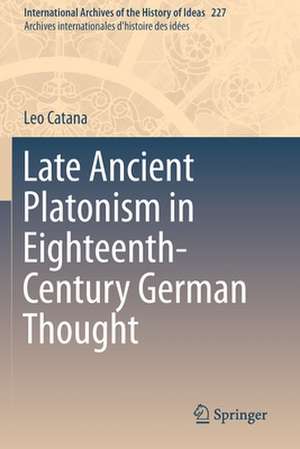Late Ancient Platonism in Eighteenth-Century German Thought: International Archives of the History of Ideas Archives internationales d'histoire des idées, cartea 227
Autor Leo Catanaen Limba Engleză Paperback – 9 oct 2020
| Toate formatele și edițiile | Preț | Express |
|---|---|---|
| Paperback (1) | 578.70 lei 6-8 săpt. | |
| Springer International Publishing – 9 oct 2020 | 578.70 lei 6-8 săpt. | |
| Hardback (1) | 584.76 lei 6-8 săpt. | |
| Springer International Publishing – 9 oct 2019 | 584.76 lei 6-8 săpt. |
Din seria International Archives of the History of Ideas Archives internationales d'histoire des idées
- 24%
 Preț: 679.97 lei
Preț: 679.97 lei - 18%
 Preț: 728.43 lei
Preț: 728.43 lei -
 Preț: 380.25 lei
Preț: 380.25 lei -
 Preț: 382.18 lei
Preț: 382.18 lei -
 Preț: 382.36 lei
Preț: 382.36 lei -
 Preț: 385.84 lei
Preț: 385.84 lei -
 Preț: 381.43 lei
Preț: 381.43 lei -
 Preț: 380.45 lei
Preț: 380.45 lei - 18%
 Preț: 1218.35 lei
Preț: 1218.35 lei -
 Preț: 379.68 lei
Preț: 379.68 lei -
 Preț: 399.29 lei
Preț: 399.29 lei - 18%
 Preț: 950.03 lei
Preț: 950.03 lei -
 Preț: 385.08 lei
Preț: 385.08 lei - 18%
 Preț: 953.20 lei
Preț: 953.20 lei - 15%
 Preț: 648.24 lei
Preț: 648.24 lei - 15%
 Preț: 641.03 lei
Preț: 641.03 lei - 18%
 Preț: 954.93 lei
Preț: 954.93 lei - 18%
 Preț: 944.19 lei
Preț: 944.19 lei - 15%
 Preț: 643.00 lei
Preț: 643.00 lei - 18%
 Preț: 1825.40 lei
Preț: 1825.40 lei - 18%
 Preț: 1224.54 lei
Preț: 1224.54 lei - 15%
 Preț: 644.63 lei
Preț: 644.63 lei - 15%
 Preț: 633.53 lei
Preț: 633.53 lei - 15%
 Preț: 647.08 lei
Preț: 647.08 lei - 18%
 Preț: 1233.06 lei
Preț: 1233.06 lei -
 Preț: 390.25 lei
Preț: 390.25 lei - 18%
 Preț: 945.92 lei
Preț: 945.92 lei - 18%
 Preț: 951.91 lei
Preț: 951.91 lei - 18%
 Preț: 1219.63 lei
Preț: 1219.63 lei - 15%
 Preț: 638.24 lei
Preț: 638.24 lei - 18%
 Preț: 1223.43 lei
Preț: 1223.43 lei
Preț: 578.70 lei
Preț vechi: 680.82 lei
-15% Nou
Puncte Express: 868
Preț estimativ în valută:
110.75€ • 115.20$ • 91.43£
110.75€ • 115.20$ • 91.43£
Carte tipărită la comandă
Livrare economică 15-29 aprilie
Preluare comenzi: 021 569.72.76
Specificații
ISBN-13: 9783030205133
ISBN-10: 3030205134
Pagini: 175
Ilustrații: IX, 175 p.
Dimensiuni: 155 x 235 mm
Greutate: 0.27 kg
Ediția:1st ed. 2019
Editura: Springer International Publishing
Colecția Springer
Seria International Archives of the History of Ideas Archives internationales d'histoire des idées
Locul publicării:Cham, Switzerland
ISBN-10: 3030205134
Pagini: 175
Ilustrații: IX, 175 p.
Dimensiuni: 155 x 235 mm
Greutate: 0.27 kg
Ediția:1st ed. 2019
Editura: Springer International Publishing
Colecția Springer
Seria International Archives of the History of Ideas Archives internationales d'histoire des idées
Locul publicării:Cham, Switzerland
Cuprins
1. From Persona to Systema: Heumann’s Dethronement of Porphyry’s Vita Plotini and the Biographical Model in History of Philosophy.- 2. The Origin of the Division between Middle Platonism and Neoplatonism.- 3. Changing Interpretations of Plotinus: The Eighteenth-Century Introduction of the Concept of a ‘System of Philosophy.- 4. Thomas Taylor’s Dissent from Some Eighteenth-Century Views on Platonic Philosophy: The Ethical and Theological Context.
Notă biografică
Dr Leo Catana is associate professor in Philosophy at the University of Copenhagen, where he works on ancient Greek and Renaissance philosophy. His main interests within these two periods concern ethics and political thought, especially within the tradition of Platonism and the way in which it has been understood and evaluated in the course of history. He is member of the editorial committee of the Classica et Mediaevalia, and he is co-organizing The Copenhagen Intellectual History seminar.
Textul de pe ultima copertă
This work synthesizes work previously published in leading journals in the field into a coherent narrative that has a distinctive focus on Germany while also being aware of a broader European dimension. It argues that the German Lutheran Christoph August Heumann (1681-1764) marginalized the biographical approach to past philosophy and paved the way for the German Lutheran Johann Jacob Brucker’s (1696-1770) influential method for the writing of past philosophy, centred on depersonalised and abstract systems of philosophy. The work offers an authoritative and engaging account of how late ancient Platonism, Plotinus in particular, was interpreted in eighteenth-century Germany according to these new precepts. Moreover, it reveals the Lutheran religious assumptions of this new approach to past philosophy, which underpinned the works of Heumann and Brucker, but also influential reviews that rejected the English Plato translator Thomas Taylor (1758-1835) and his understanding and evaluation of late ancient Platonism.
Caracteristici
Explains Platonism during the European Enlightenment Questions whether the term "Neoplatonism" should be discontinued Discusses the role of key figures in the 18th century, especially Johann Jakob
